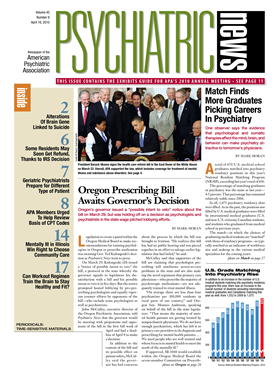Who thinks that the work psychiatrists did 11 years ago is identical in intensity and difficulty to the work they do today?
Dramatic changes have taken place in psychiatric practice during that time—in the availability of drugs, the complexity of patients with comorbid conditions, new treatment guidelines, as well as the increased administrative burden associated with caring for patients and running a practice. Yet it was 11 years ago that CPT codes for psychiatry were last reviewed by the federal government.
On November 25, 2009, the federal Centers for Medicare and Medicaid Services (CMS) published a call for a new review of CPT codes in the Federal Register. APA responded by forwarding a number of psychiatry codes for review—a process that may result in changing the amount clinicians will be reimbursed under Medicare, and by extension by some private insurance companies.
Specialty societies like APA play a large role in this reevaluation by having members participate in a survey of the “relative work values”—the component of the Medicare payment formula that places a value on procedures performed by clinicians based on the intensity of work involved in those procedures compared with other medical procedures.
That's why APA is looking for psychiatrists who are knowledgeable about coding and willing to participate in the survey process.
“This directly affects how virtually every psychiatrist gets paid by the CMS and indirectly affects payment by private carriers,” said Ron Burd, M.D., APA's representative to the AMA's Relative Value Scale Update Committee (RUC), which coordinates the survey process.
Psychiatric News has published two notices about this process (March 19 and April 2). APA's Office of Healthcare Systems and Financing is prepared to help educate members about the review process and last month held an educational Webinar on the AMA RUC survey process that is now available online. The 30-minute Webinar gives members an overview of the RUC and its survey process, as well as the survey form. Additionally, the RUC has a detailed and easily accessible educational PowerPoint program posted at APA's Web site.
The government's formula for Medicare payment can be a formula for a headache, but at its heart are two principles—it is resource-based, meaning it aims to approximate the resources used by a physician to perform any procedure; and it aims for relative equality across procedures that involve similar skills, techniques, and resources—hence the name, Resource-Based Relative Value Scale (RBRVS), developed by Harvard health economist William Hsiao, Ph.D., in the 1980s.
Prior to the use of the RBRVS, the government paid “usual and customary” fees that were determined by physicians. Burd explained that the government came to believe there was no way to determine the extent to which “usual and customary” reflected the true value of a service, and so the RBRVS was adopted in an effort to approximate something like a rational form of reimbursement.
The “resource” part of a payment involves three components—physician work, practice expense, and liability fees. And the “relative value” part involves comparing physician work for any procedure—say, psychotherapy—with another procedure that involves similar skills and techniques, such as “evaluation and management.”
So APA members who participate in the review process will be asked to complete a survey in which they compare a common psychiatric procedure with another procedure familiar to psychiatrists—for example, compare psychotherapy with standard office-based evaluation and management. Burd said that this procedure is a way of acknowledging that there are “crosswalks”—the term for similar skills and techniques in disparate medical procedures—between what different specialists do.
“The relative value is an attempt to move across medical procedures and say, ‘How do we value what a neurosurgeon does compared with what a psychiatrist does, or what a psychiatrist does compared with what a pediatrician does?’ The idea is that for any specialty there are things that are easier to do and harder to do, and while placing an absolute value on the procedure isn't possible, it is possible to say, ‘This is harder to do relative to that.’”
